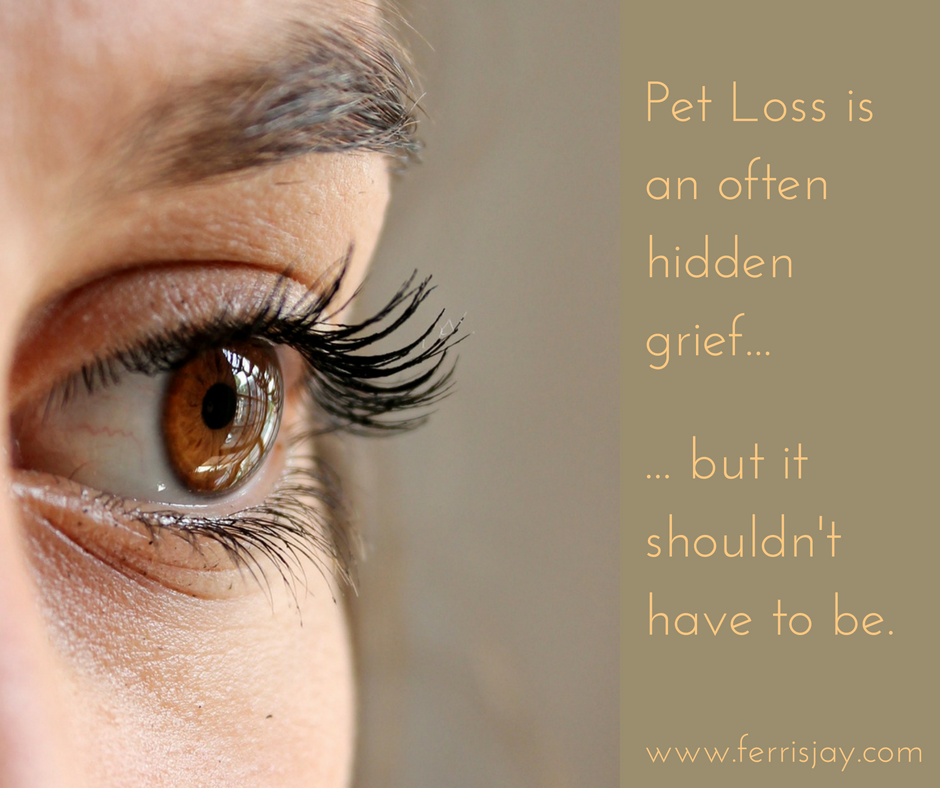
Is pet loss a hidden grief?
Navigating the grief of losing a pet is hard enough, but feeling that you have to hide that grief, because others don’t understand it, just adds the the pain.
The sense of loss of the unconditional love, of the deep companionship, of that lifelong friendship can be shockingly painful, in many ways.
That grief is not hidden from the griever.
The constant reminders, such as the empty spot where they used to sit, the quietness without them, the missing of them at their usual mealtimes – all those things can trigger our grief many times a day.
Yet, many people attempt to hide the fact that they are grieving, from others an sometimes even from themselves.
The stigma of grieving for our pets.
Unfortunately, this grief is often complicated by the social stigma of grieving for the loss of pets.
Many people, especially those who have never experienced a close relationship with an animal companion, don’t understand this grief, the intensity of it, how real it is.
They can belittle it, dismiss it or be outright unkind about it.
Their words, even if meant kindly, can be very hurtful for griever, as can their lack of understanding (for what NOT to say to those grieving the death of a pet, please read this post).
This in turn can lead to people hiding their grief, for fear of not being understood or even being ridiculed.
For someone who is grieving, to go back to work and back out in the world whilst they are in intense pain can be very challenging.
Nobody would expect someone grieving the death of a family member to return to work (and to ‘normal’ life) straight away.
Yet, many pet parents / guardians feel that they aren’t free to openly grieve the loss of their animal members of the family.
Some of my clients have feared that they will be ridiculed or at the very least misunderstood and regarded as ‘weak’ or ‘soft’ if it is noticed that they are showing their grief and upset about the death of a pet, especially after a few days have passed. Their grief is still raw, but now they feel they have to hide it.
The dangers of hiding your grief.
Hiding your grief may seem like a good way to cope, especially when others don’t understand, but it really isn’t the answer.
By hiding away your feelings and fearing that you’ll be misunderstood, you can start to become isolated and you may hinder your natural grieving process, especially if you are trying to ‘be strong’ and to deny the intensity of your emotions.
Repressing your feelings is not healthy for your mind or body, especially in the long term.
That isn’t to say that it’s necessarily a good idea to wear your heart on your sleeve either. If you openly share how you feel with everyone, you are likely to come across people who are not sympathetic and may even be unkind, and that can be a challenge to handle.
So what do you do?
1. Acknowledge what you are feeling.
The first part of the healing process is to recognise what you are feeling and going through.
Your grief is real, please acknowledge that.
2. Create a support network
Seek out those people that are most likely to understand what you are going through.
This can be other pet lovers and maybe some close friends or family members.
It can also be a local pet loss support group, a phone support line or working personally with a Pet Loss Counsellor like myself.
3. Support yourself
When I work with my clients, I encourage them to be kind to themselves and I often suggest self care practices.
This can feel quite foreign and strange but it really does help the healing process.
You have been there for your pet and now it’s time to be there for you.
At the very least, be sure you are eating well, looking after your own personal hygiene and you are retaining contact with people you love.
4. Know when to get extra help and support.
Please don’t shy away from getting support. You don’t have to go through this alone.
Grief is very challenging, but it doesn’t have to be prolonged torture either.
Pet Loss Counselling can help you take stock and look at your emotions in a safe environment, and it can help you look at ways to best cherish the memories of your pet.
There are also ways to process your emotions and ride the waves of grief that allow it to be a gentler process.
I recommend and use mindset and energy psychology techniques, such as EFT tapping, to help people navigate the grieving process safely and gently.
Please note that if you feel you are unable to function normally you may require professional support.
If you would like to find out more about working personally with me, you can book a free 15 minute introductory Skype or phone consultation with me by clicking here.
Video
In this week’s video I explore this issue further.
Resources
As mentioned in the video, I have a free Pet Loss Resource, my “Mini Pet Loss Survival Guide”, with some more suggestions for navigating pet loss.
Click here to get this free guide.
What’s your experience?
I’m curious to know what your experience of pet loss grief is.
Have you felt that you had to hide your grief away?
Were the people around you understanding or supportive, or not?
Let me know in the comments section below this post.
Also, please share this post with those who need it, maybe a friend who you feel might be finding it hard to cope after the death of an animal companion.
Thank you.


Sorry, comments are closed for this post.